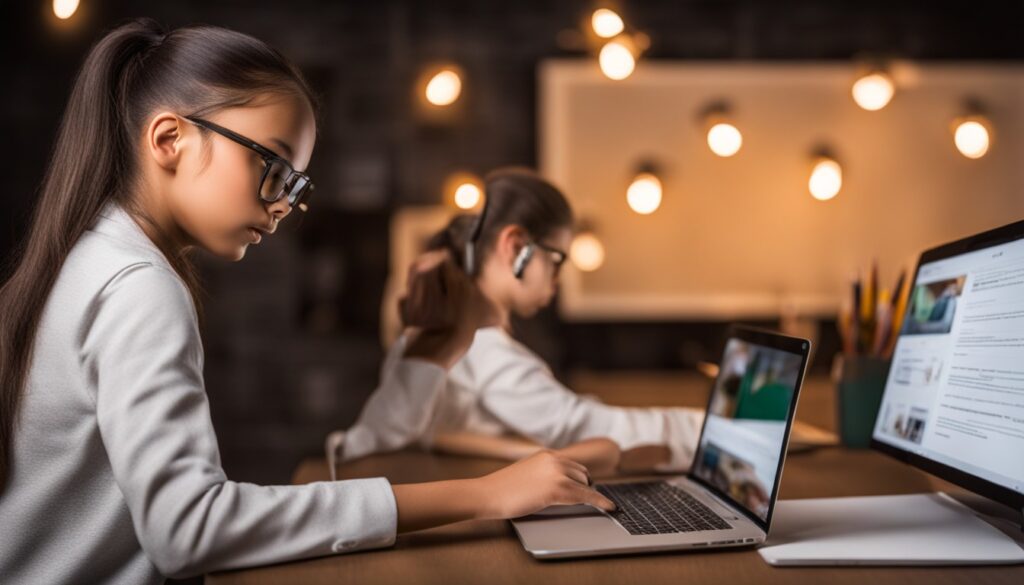In today’s world, digital literacy is becoming more and more important every day. Over the past few years, there has been a huge shift in how people learn and how we are taught. We are now living in a digital era where anything that can be digitized will be.
Instead of sitting in a classroom listening to a teacher’s lecture, most people prefer to take educational content on the go from their smartphones or tablets. This is why it is so important to understand what digital literacy means and why it is changing education as we know it. What Is Digital Literacy?
What Is Digital Literacy?
With the increasing use of digital devices and platforms, it is extremely important to understand digital literacy. Digital literacy is the ability to use computers and the Internet to find information and communicate in written and digital forms. Digital literacy also includes being able to use digital devices to find and create information as well as being able to use technology creatively.

Basic Digital literacy is defined as the ability to “use computers and the Internet to find information and communicate in written and digital forms.” Many people often assume that digital literacy means being able to type a certain key on a keyboard or use a certain app on a phone or tablet. However, digital literacy is much more than that. It is the ability to use technology in a creative way to find and create information.
The Importance of Digital Skills
Today, jobs are not just done in an office. A large percentage of jobs are done outside of the traditional office setting. Due to this change, we have had to adapt our education system to meet the needs of the future workforce. Instead of just teaching children specific information, we have had to teach them how to acquire and use that information.
This means that children are being taught how to write emails or use social media accounts instead of just being taught a certain topic. Because of this, children need to learn and practice basic digital skills like keyboarding, social media basics and email etiquette. When children can apply these skills, they can reach out to a diverse group of individuals, communicate with ease and find information.
Why is Learning Basic Digital Skills Important?
With the amount of time people spend on their smartphones, tablets and computers every day, it is more important than ever to learn basic digital skills. With these skills, people can communicate with ease and find information.
With these skills, people can also apply their knowledge in a variety of fields and make a positive impact on society. Basic Digital skills can help people look for jobs and apply for jobs, contact family and friends, find health information and so much more. It is important to learn these skills so people can communicate efficiently and make the most of their time.
Understanding the Importance of Digital Literacy in Education
In today’s world, children need to learn basic digital skills. These skills can help people communicate efficiently and find information. When people can apply these skills in their daily lives, it makes life much easier.
Children need to learn these skills so they can participate in a digital world and make the most of it. When children learn basic digital skills, it can have a huge impact on their future. Many jobs are only available online and having these skills opens those options for people.
How to Increase Digital Literacy?

Online Courses and Tutorials
One of the most accessible and convenient ways to acquire digital literacy is through online courses and tutorials. Countless platforms offer a plethora of digital literacy courses, ranging from beginner to advanced levels. These courses typically include instructional videos, reading materials, quizzes, and assignments, allowing you to learn at your own pace.
Whether you’re starting from scratch or looking to upgrade your existing skills, online courses offer flexibility and a structured learning environment to help you progress.
Interactive Workshops and Webinars
If you prefer a more interactive learning experience, consider participating in digital literacy workshops and webinars. Many organisations, including libraries, community centres, and tech companies, host these events to promote digital literacy within communities.
Workshops and webinars often feature hands-on activities, live demonstrations, and opportunities for questions and answers. This interactive approach can be particularly effective for individuals who thrive on direct engagement and personal guidance. These events are a valuable resource for gaining practical skills while building confidence in a supportive environment.
Self-Directed Exploration
Digital literacy doesn’t always require formal courses or workshops. You can also enhance your skills through self-directed exploration. This method involves independent learning and experimenting with various digital tools and platforms.
Start by identifying areas of digital literacy you’d like to improve, such as word processing, graphic design, or social media management. Then, explore online resources, tutorials, and user manuals specific to the tools you wish to master. As you practice, you’ll gradually build proficiency and confidence in these areas.
For instance, you can begin by learning the basics of Microsoft Office or Google Workspace, gradually expanding your skill set to encompass more advanced features. The key to successful self-directed learning is persistence and a willingness to explore and experiment.
Digital Literacy Apps and Games
Gamification has become a powerful tool in learning, including digital literacy. Numerous apps and games are designed to teach basic digital skills while making the learning process engaging and enjoyable.
Platforms like Duolingo and Codecademy offer interactive lessons on coding and programming, while apps like TypingClub help improve keyboarding skills. These gamified experiences provide instant feedback, track your progress, and often incorporate competition elements, making learning a fun and motivating experience.
Peer Learning and Support

Don’t underestimate the value of learning from your peers and seeking their support. Many online forums and social media groups are dedicated to digital literacy and technology-related topics. These communities allow you to ask questions, share experiences, and seek guidance from individuals with varying levels of expertise.
Consider forming or joining a study group with friends or colleagues to learn and practice basic digital skills together. Peer support can boost your motivation, and the exchange of ideas and knowledge can be invaluable.
Conclusion
Digital literacy is the ability to use computers and the Internet to find information and communicate in written and digital forms. Digital literacy also includes being able to use technology in a creative way to find and create information. Digital literacy is defined as the ability to “use computers and the Internet to find information and communicate in written and digital forms.”
Many people often assume that digital literacy means being able to type a certain key on a keyboard or use a certain app on a phone or tablet. However, digital literacy is much more than that. It is the ability to use technology in a creative way to find and create information. When people can creatively use technology, it can have a huge impact on their lives.
It can allow people to communicate with ease and find information. Knowing more about the world around you is what helps with increasing your digital literacy. The best way to increase your digital literacy is to continue to learn new things every day.









